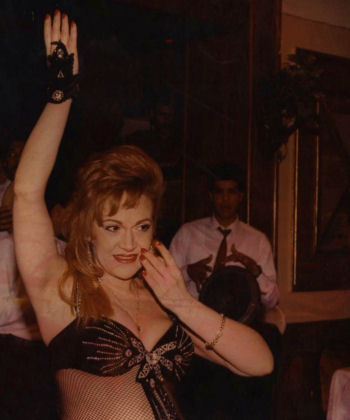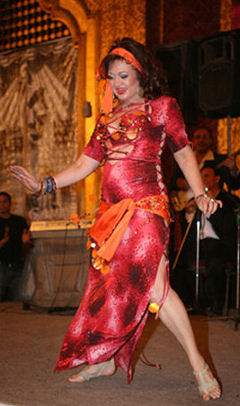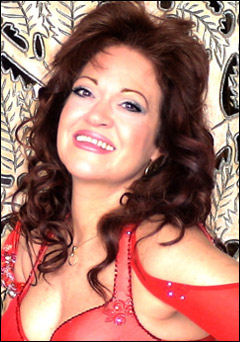
INTERVIEW WITH DIANA TARKHAN
January 17, 2009
What first interested you in Oriental Dance? What first caught your eye?
First you must understand my introduction to Oriental dance. I saw it in nightclubs - first in Paris and then in Egypt. This was 30 years ago, so a nightclub show means not only the dancer, but the singers and the musicians too, and a complete Oriental atmosphere. The programs in the nightclubs at that time never started before 1am and run until 7 or 8am the next morning. They were filled with the most brilliant crowd you can imagine actors, movie directors, famous business men from the Middle East, gorgeous call girls. I think I was seduced by the complete package - the magic of "Oriental nights", although the dancer, of course, was my favorite.
Who were your most influential teachers?
Raqia Hassan and all the Egyptian stars I watched performing on stage, such as Fifi Abdo, Mona Said, Nagwa Fouad, and many others.
What qualities do you think a good dancer should possess?
Musicality is first, because Oriental dance is supposed to physically translate the music. Sensibility and love for this music seem more and more difficult to find in my work. For example, I know many dancers who have been performing for years that do not know who Warda is. Of course I am only talking about professionals - I would not have the same expectations towards a person who is just taking lessons as a hobby.
About physical ability, she must be flexible and strong at the same time. A difficult combination, but with hard work everything is possible.
What distinguishes an exceptional dancer from a mediocre dancer?
Musicality, fluidity of the movements, personal interpretation, and the fact that when we look at her, we do not feel the effort in the dance to me, these are what makes a good dancer.

What do you thinks of all the fusions happening right now?
It is interesting, because it's always good to see new arts forms developing. On the other hand, the danger is that people will be tempted to have a bit of this and a bit of that, and mix everything without any depth or real technique in their dance. Myself I prefer to concentrate on one thing and dig into it. Until now I am not done with Oriental dance, even after practicing it for 30 years now.
Can you describe the evolution of your dance style/tastes in recent years?
When I arrived in Egypt, the dance was more simple than today. The dancer took her time on the music. Today things are faster. I guess the dance is also. Plus many influences from other dances have transformed it into a more modern style with incorporation of jazz steps, salsa, samba, etc. I've had to adapt myself. But I still enjoy watching a good authentic Oriental dancer.
You're a very dynamic performer. What had the most impact on developing those skills for you?
I think it's due to the fact that the dance is faster today - years before I was dancing differently. Also my personality is dynamic, so I guess we show a bit of ourselves when we dance.
What does it take for others to develop a powerful stage presence and projection?
Self confidence and self esteem. When I was a new dancer, I was scared to get on stage. So every night, I was telling myself, "Those people are all your friends and they like you". Which was absolutely not true, but self suggestion sometimes works.
What advice can you offer to people who want to become serious performers?
Listen to a lot of Egyptian music. When I started to perform and wanted to use new music, I would listen to it every day, 10-20 times during one month. Until it became a part of myself and I knew every note and change without thinking. Also, dancing for yourself alone everyday - doing improvisation is very beneficial to improve your skills.

Who's your favorite costume designer at this moment?
It depends, but I would say Raqia Hassan and Eman Zaki. Also Sahar Okasha.
Do you have any plans to start producing DVDs?
Well, I am thinking about it. But I haven't decided which form it should have. There is a DVD on the market with me teaching 2 choreographies called "Master of Egyptian Choreography Instructional DVD".*
*Available from http://www.natashasenkovich.com/
What is your opinion of the current climate in Egypt for dancers?
For a while it seemed that many places with Oriental dancers closed. But they're starting to open again. The increase of religious attitudes affected this dance. But even with that situation, there will always be dancers in Egypt because tourists want to see Oriental dance. It is as popular as the Pyramids.